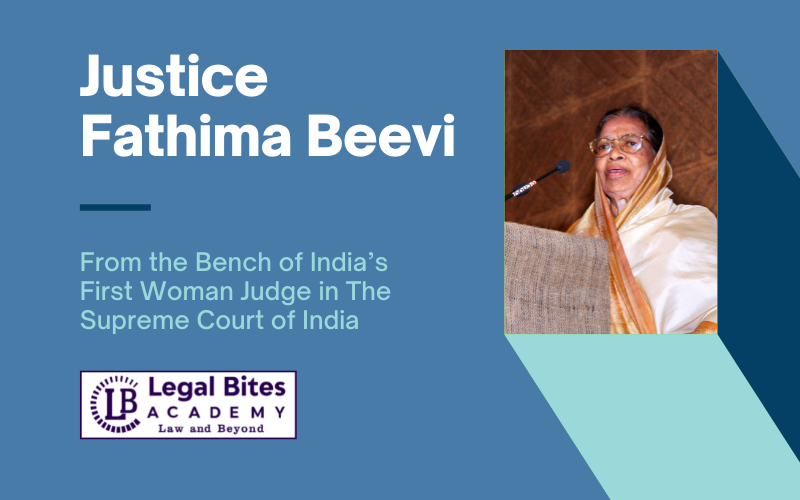
This article titled ‘Justice Fathima Beevi: From the Bench of India’s First Woman Judge in The Supreme Court of India’ is written by Eshanee Bhattacharya and reflects on the legacy of Justice Fathima Beevi.
I. Introduction
In the corridors of Justice where gender equality and gender representation is silenced by patriarchy, Justice Fathima Beevi, shattered the glass ceiling by becoming the first female judge in the Supreme Court Bench. In a profession that provides justice, J. Fathima Beevi presided over the bench with pride paving the way for future lawyers and advocates and celebrate this profession.
Fathima Beevi set the foundation stone for women judges in the Supreme Court of India a little more than three decades ago. Beevi’s appointment to the Supreme Court was historic not just because of her gender, but also because she was the first Muslim woman to hold a post in India’s higher judiciary.
II. Life and background
Mr. Meera Sahib and Khadeeja Beevi gave birth to Justice M. Fathima Beevi on April 30, 1927, in Pathanamthitta (Kerala)[1]. She was the eldest daughter of Annaveettil Meerasahib and Khadeeja Beevi. Father Meera sahib worked for the Department of Registration. He valued his children’s education, which enabled Fathima to pursue a career in law.
She received her education at Catholicate High School in Pathanamthitta, a B.Sc. from University College in Trivandrum, and a Bachelor of Law from Trivandrum Law College. She was one of just five female students in her class who were pursuing a law education.
She planned to continue her studies in science but her father, perhaps inspired by the success of Ms. Anna Chandy[2] (India’s first female judge and the first woman to become a High Court judge), who worked near their home, urged Beevi to pursue law instead.
III. Legal career
After passing the Bar Council exam with flying colours in 1950, Justice Fathima began her career as an advocate. She worked as a litigator in Kerala for eight years before being assigned to the Kerala Subordinate Judicial Services court as a Munsiff in May 1958.
In 1968, she was elevated to Sub-ordinate Judge, and in 1972, she was promoted to Chief Judicial Magistrate. On the 6th of October, 1989, Justice Beevi was appointed as the first Asian Muslim female Judge of the Supreme Court of India, a position she held until her retirement on the 29th of April, 1992[3]. In 1997, Justice Beevi was appointed as the Governor of Tamil Nadu, a position she craved.
Justice Fathima Beevi served as a member of the National Human Rights Commission (1993) and the Chairman of the Kerala Commission for Backward Classes after retiring from the Supreme Court in 1992.
IV. Firsts and achievements
- First Woman to top the Bar Council of India’s Exam
- First Woman Judge in the Supreme Court of India
- First Woman Judge in the Supreme Court of an Asian Nation
- First Muslim Woman Judge in the Supreme Court of India
In 1990, she was awarded the Hon. D Litt and Mahila Shiromani Award. She also received the Bharat Jyoti Award and the Lifetime Achievement Award from the US-India Business Council (USIBC). She was the Governor of Tami Nadu and the Chancellor of Madras University at the same time.
V. Contribution to legal judgements
In a Civil suit, Rattan Chand Hira Chand v. Askar Nawaz[4], the Court had the occasion to decide upon the validity of a contract in the purview of section 23 of the Indian Contract Act, 1872. Justice Beevi, in the light of given facts and circumstances, held,
“Every agreement of which the object or consideration is unlawful is void. The consideration or object of an agreement is unlawful when the court regards it as opposed to public policy. If anything is done against the public law or public policy that would be illegal inasmuch as the interest of the public would suffer in case a contract against public policy is permitted to stand. Public policy is a principle of judicial interpretation founded on the current needs of the community. The law relating to public policy cannot remain immutable. It must change with passage of time.”
References
[1] Wikipedia Contributors (2021). Fathima Beevi. [online] Wikipedia. Available Here.
[2] Wikipedia Contributors (2021). Anna Chandy. [online] Wikipedia. Available Here.
[3] Khushi Agarwal (2019). Justice Fathima Beevi: The First Indian Woman To Become A Supreme Court Justice. [online] Feminism In India. Available Here.
[4] (1991) 3 SCC 67